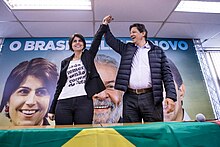Manuela d'Ávila
Manuela Pinto Vieira d'Ávila , known as Manuela d'Ávila , (born August 18, 1981 in Porto Alegre ) is a Brazilian journalist and politician who belongs to the Communist Party of Brazil (PCdoB). She was a federal member of Rio Grande do Sul in the Chamber of Deputies of the National Congress between 2007 and 2015. She is currently a member of the state in Rio Grande do Sul and was a vice-presidential candidate for the electoral alliance "O Brasil Feliz de Novo" (New Happy Brazil) in the 2018 presidential election in Brazil .
Life
Manuela d'Ávila was born in Porto Alegre as one of five siblings of the engineer and university professor Alfredo Luís Mendes d'Ávila and the judge Ana Lúcia Pinto Vieira. The mother's profession led to several moves in her youth. At the age of 14 she received a school education at the Centro de Ensino Médio Pastor Dohms and studied journalism at the Pontifícia Universidade Católica do Rio Grande do Sul ( Pontifical Catholic University of Rio Grande do Sul , PUCRS). This was followed by an incomplete study of social sciences at the Universidade Federal do Rio Grande do Sul (UFRGS).
She has been married to rock musician Duca Leindecker since 2012 and has a daughter.
Political career
At the UFRGS she came into contact with student movements, joined the União da Juventude Socialista (UJS, Socialist Youth Union), an arm of the Communist Party of Brazil incorporated in 2001, was in the national leadership of the UJS and vice-president for the from 2001 to 2003 Southern region of the União Nacional dos Estudantes (UNE, National Student Union). At the age of 24 she became the youngest councilor (vereadora municipal) of the city of Porto Alegre, for which 9,498 or 1.19% of the valid votes were sufficient. In the elections in Brazil in 2006 , she achieved 271,939 valid votes, the highest number of votes to date for a parliamentary election in the state and became a federal member of the National Congress in Brasília for the PCdoB . In the elections in Brazil in 2010 she was re-elected with 482,590 or 8.06% of the valid riograndens votes.
In between, however, in 2008 and 2012 she had unsuccessfully applied for the office of city prefect (mayor) of Porto Alegre. On September 16, 2013, she announced that she would not run for a third term as a member of the Bundestag in the 2014 elections, but wanted to go into state politics. With 222,436 or 3.64% of the valid votes, she became a member of the legislative assembly of Rio Grande do Sul (Assembleia Legislativa) on January 1, 2015 .
2018 presidential election
In November 2017, the PCdoB announced its nomination as a pre-presidential candidate, the first time the party has put up its own candidate since the country's democratization. The official proclamation took place on August 1, 2018, leaving possible alliances with other left-wing parties open. The legally prescribed withdrawal of Lula da Silva of the Workers' Party (PT) as a presidential candidate and the nomination of Fernando Haddad in his place on September 11, 2018, led to a change. Instead of running for president herself, d'Ávila became Haddad's candidate for the office of vice president in the electoral alliance "O Brasil Feliz de Novo" with PT, PROS , PCO and the PCdoB.
In the first ballot on October 7, 2018, 31,341,997 or 29.28% of the valid votes voted for the Haddad-d'Ávila candidate duo. In the run-off election on October 28, 2018, they were defeated by the Bolsonaro - Mourão alliance with 44.9% of the vote (47,040,819 votes in total).
Web links
Individual evidence
- ↑ Eleições 2008 Candidatos> Perfil Manuela D'Ávila. In: Zero Hora. www.clicrbs.com.br, September 14, 2008, accessed September 14, 2018 (Brazilian Portuguese).
- ↑ Ricardo Della Coletta Marreiro, Flávia Afonso Benites: Haddad, vice e plano B de Lula, ganha reforço de Manuela D'Ávila no último minuto. In: EL PAÍS. August 6, 2018. Retrieved September 14, 2018 (Brazilian Portuguese).
| personal data | |
|---|---|
| SURNAME | d'Ávila, Manuela |
| ALTERNATIVE NAMES | d'Ávila, Manuela Pinto Vieira (full name) |
| BRIEF DESCRIPTION | Brazilian politician |
| DATE OF BIRTH | 18th August 1981 |
| PLACE OF BIRTH | Porto Alegre , Rio Grande do Sul |

